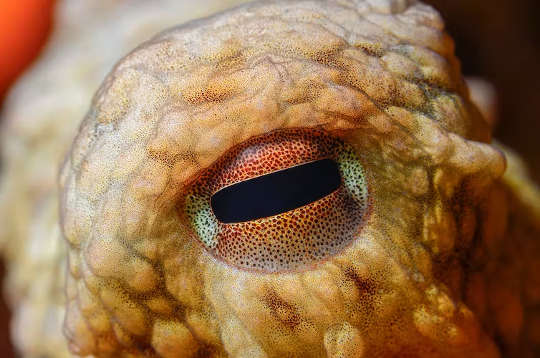
Octopus eye. Osman Temizel/Shutterstock
Octopus is a popular ingredient in many cuisines, with some 420,000 metric tonnes of this mollusc being caught worldwide each year. The rising global popularity of octopus has been attributed to the increasingly adventurous tastes of younger consumers, its nutritional benefits and the decline of traditional fish stocks such as cod. This helps explain why the food processing corporation, Nueva Pescanova, aims to build the world’s first indoor octopus farm in Gran Canaria: a thousand-tank facility for producing 3,000 tonnes of octopus a year.
Octopuses can pile on a staggering 5% of their body weight in a day which makes them an appealing prospect for aquaculture, though they are notoriously difficult to breed in captivity. Nueva Pescanova claims to have made an important scientific breakthrough, however, which will allow them to raise successive generations of Octopus vulgaris, otherwise known as the Atlantic common octopus. The firm argues that farming octopus will reduce fishing methods such as sea-bed trawling, for example, and ensure a supply of “marine-based food” while also “relieving pressure on wild fishing grounds”.
But it is no simple matter for consumers to weigh up the costs and benefits of eating farmed fish and marine animals. It is tempting to believe that organised systems reduce the risk of overfishing, but it is also well established that fish farms and other forms of aquaculture pollute coastal waters with pharmaceuticals and faeces. Added to this is the serious moral issue of confining sentient creatures to industrial food systems.
Researchers have suggested that, as particularly intelligent and playful creatures, octopuses are unsuited to a life in captivity and mass-production. Animal rights activists argue that farming octopuses will, based on this evidence, induce needless suffering on an unprecedented scale.
Get The Latest By Email
Sentient beings trapped on industrial farms
Scientists at Dartmouth College in the US have studied how octopuses experience reality in a specialist lab. Their research raises concerns about methods of slaughter proposed by Nueva Pescanova: placing octopuses into an ice slurry to reduce their temperature to the point of death. They question the appropriateness of this for a species that has sophisticated capacity for processing information, rudimentary tool use, complex visual pathways and, not least, the capacity for pain.
While land mammals are usually killed using gas chambers or electrical stunning, there have been similar criticisms in relation to large-brained and sentient species, including cows and pigs. This is a contentious area that was debated in the UK parliament, resulting in formal recognition of the sentience of many species including crabs, lobsters and octopuses within the 2022 Animal Welfare (Sentience) Act.
Some research findings suggest that octopuses have an equivalent intelligence to cats – a species few choose to consume and most treat as lovable companions. Why, then, do we eat octopus but not cats? One possibility is our difficulty in relating to octopuses: their personalities are hard to read and their water-dwelling bodies resemble miniature sea monsters with multiple tentacular limbs and bulging eyes. As with so many sea animals, the charisma of the octopus lies in its other-worldliness, with centuries of myth and legends about these mysterious others in the songs and stories of fishermen.
We don’t generally perceive molluscs as cute, and it is difficult to consider them companionable or friendly, despite the overwhelming scientific evidence of the richness of their behavioural repertoires. Does this make octopus – and other aquatic creatures, like squid and crustaceans – easier to eat? I think so. It is something that researchers have called speciesism: the thinking that, somewhat arbitrarily, justifies how some animals are perceived as pets or valued co-workers and others simply as food-in-waiting. Our trouble in relating to these mysterious others may well be the ethical justification required to make eating them acceptable: something I have researched in the context of farmed mammals.
As with other food and farming debates, there are no simple solutions or compromises. The tensions between consumer demands and the market’s capacity to satisfy them rumble on. With so many sources of protein, it is not assured that anyone needs to eat octopus at all. Yet food is also bound up with cultural values, sociability and ideas of good taste. At least science can better inform us about the implications of what and how we eat.
Food production is one of the great moral challenges that humanity faces in the 21st century. While companies like Nueva Pescanova promise solutions to problems like overfishing, there will always be a price paid by the countless sentient beings ensnared in complicated industrial food systems.
About The Author
Lindsay Hamilton, Professor of Animal Organization Studies, University of York
This article is republished from The Conversation under a Creative Commons license. Read the original article.
books_pets







